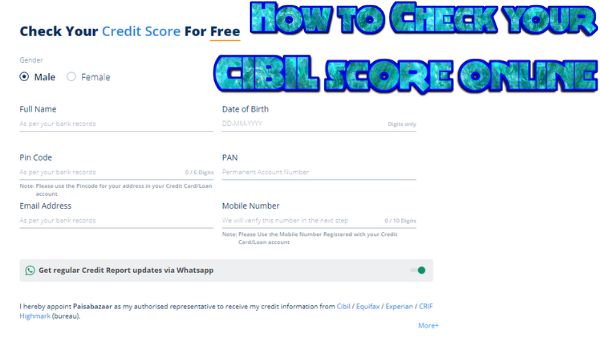How to Check your CIBIL score online

How to Check your CIBIL score online- The Credit Information Bureau (India) Ltd., a credit rating company authorized by the Reserve Bank of India, provides the CIBIL score (RBI). Individuals can access CIBIL scores and credit records, in addition to banks and non-banking financial institutions (NBFCs).
These ratings are based on your credit history, which might include everything from a history of loan payback to a history of credit card payments. Financial organizations see this three-digit figure, which varies from 300 to 850, as a measure of your creditworthiness when deciding whether to provide loans and issue credit cards.
How to Check your CIBIL score online:
You can check your CIBIL score online by given procedure:
Step 1: Visit the CIBIL website’s official page.
Step 2: Click on “Get your CIBIL Score.”
Step 3: Type your Name, email address, and password. Include identification documentation (passport number, PAN card, Aadhaar or Voter ID). Now Type your PIN number, birthdate, and phone number.
Step 4: Tap “Accept and proceed.”
Step 5: On your cellphone number, you’ll get an OTP. Enter the OTP and then click “Continue.”
Step 6: Choose “Go to dashboard” to view your credit rating.
Step 7: You’ll be sent to the website myscore.cibil.com after that.
Step 8: After logging in, choose “Member Login” to view your CIBIL score.
Online Payment and CIBIL Score Checking:
The procedures listed below can be used to check your CIBIL credit scores online.
- Click on Know Your Score after logging onto the official CIBIL website.
- Fill out the online form, which includes fields for name, birthdate, residence, identification verification, previous loan history, and other pertinent information.
- You will be sent to the payments page after completing the form and approving any changes. Numerous payment options are available, including prepaid cards, credit cards, net banking, etc. You must pay CIBIL Rs. 550 in order to obtain your credit report.
- You will be sent to an authentication page after completing the payment successfully. Here, you must respond to 5 questions on your credit history, of which you must accurately answer at least 3 in order for CIBIL to verify your identity. Within the next 24 hours, your report will be delivered to your email address.
- In the event that authentication is unsuccessful, you can fill out and mail a paper copy of the application to CIBIL. The report will thereafter be mailed to you as well.
Cibil Score Range
The maximum CIBIL score is 900, with scores ranging from 300 to 900. People having a CIBIL score of 750 or more are often regarded as responsible borrowers. Here are the various CIBIL score ranges.
Your CIBIL score will be NA/NH if you have no credit history, which denotes either “not applicable” or “no history.” You won’t have a credit history if you’ve never used a credit card or applied for a loan. You should think about using credit since it will enable you to establish a credit history and have access to credit products.
350 – 549:
This range of CIBIL scores is regarded as a poor range. It indicates that you have missed payments on loan EMIs or credit card obligations. You will find it challenging to obtain a loan or credit card if your CIBIL score is in this level since you run a significant chance of defaulting on your obligations.
550 – 649:
This range of CIBIL scores is regarded as fair. However, since this is still below the ideal CIBIL score level, only a small number of lenders would think about giving you credit. It implies that you have had trouble making on-time payments of the bills. The loan’s interest rate may potentially be greater. To get better loan terms, you must make genuine efforts to raise your CIBIL score.
650 – 749:
You are headed in the right direction if your CIBIL score is in this range. You should maintain your good credit habits to raise your rating even higher. Lenders will take your credit application into account and make you a loan offer. You might not, however, still have the ability to negotiate for the best loan interest rate.
750 – 900:
This CIBIL score is quite impressive. It implies that you have a solid payment history and have made credit payments on time. Banks will provide you loans and credit cards because they believe you have a low chance of defaulting.
3 Important Pointers for a Great CIBIL Score
An optimal CIBIL score is one that is at least 750. A good CIBIL score is important since it helps you when you apply for a loan or credit card. Maintaining your CIBIL score level since the start of the year might improve your chances of quickly receiving a loan approval. It’s crucial to keep your CIBIL score in good shape. Here are some crucial pointers for achieving a high CIBIL Score.
Be Disciplined:
The two factors that most strongly affect your CIBIL score are credit card and loan repayments. Therefore, keeping up with your debt obligations should be a top concern.
Low Credit Utilization Ratio:
For a decent CIBIL score, keep your credit usage percentage at 30 percent. If you are having trouble staying within the credit card’s current limit, it is recommended that you apply for one with a greater upper limit.
Seek Variety:
To have a high CIBIL score, it is preferable to have a balanced debt load that is both secured as well as unsecured. A car loan is a secured debt, while a credit card debt is an unsecured obligation.
How to Improve Your CIBIL Score?
A good CIBIL score is crucial since it influences whether or not banks will grant you a particular amount of credit. Your chances of receiving an easier credit approval rise with a high CIBIL score. Here are five quick and efficient strategies to raise your CIBIL score.
Check and Monitor your CIBIL Score:
Knowing your CIBIL Score often can help you understand your credit situation. By requesting a subscription-based credit score, you can keep track of your CIBIL score. Additionally, you may monitor your score utilizing the CIBIL report from the top Indian credit agencies. Examining your credit account’s records for inaccuracies or misleading information is another reason to verify your CIBIL score.
Check your credit report:
In addition to keeping an eye on your CIBIL Score, it is recommended that you review your credit report because it may include inaccuracies. Reviewing your credit report frequently is preferable so that errors may be fixed promptly.
Limit your Credit Usage:
The most crucial thing to remember while using credit cards is to keep your cool. Verify that you are not using up all of your credit. Spend no more than 50% of your credit card limit up until your CIBIL score hits 750.
Raise the credit limit you have:
The maximum amount you may borrow with the card is known as a credit limit. Request a credit limit increase from your credit card company.
Pay your bills on time:
Make sure to pay all of your bills on time to demonstrate that you can effectively manage your debt. To keep your credit score high, avoid making late payments on your obligations. Never make partial payments since doing so might indicate that you are an unreliable credit user and lower your CIBIL score.
CIBIL Score-Affecting Factors
Four essential components make up a CIBIL score. Each component is weighted differently. Let’s examine the variables and how they could impact your CIBIL score.
| Payment History | 30% |
| Credit Exposure | 25% |
| Credit Type and Duration | 25% |
| Other Factors | 20% |
Payment History:
You must pay your monthly credit card bills and loan EMIs on time in order to keep a high score. Your credit will suffer if you are making late payments or defaulting on EMIs. Regularly missed payments are another sign that you have trouble maintaining good credit. According to a recent CIBIL investigation (published by the Financial Express), a 30-day delinquent might result in a 100-point drop in your score.
Credit Utilization Ratio:
A loan or several credit cards do not have a negative effect on your CIBIL score. Your score will drop, nevertheless, if your credit usage percentage is high. You should ideally only use up to 30% of your credit limit. A greater credit utilization ratio indicates that your debt load has been growing and that you are more likely to become insolvent. Keeping track of your credit card spending will help you avoid going over your credit limit.
Type of Credit and Duration:
Your credit history’s age is determined by how long it has been since you initially established a credit account. The average number of years that you have held a credit account is taken into account by CIBIL. Your credit score is boosted by having a healthy mix of secured (home or auto loans) and unsecured (credit card) loans.
A healthy credit mix indicates that you have a lot of expertise managing various kinds of accounts. You are a low-risk borrower if you have a solid payback history and a long credit history. It is best to begin establishing your credit history as soon as possible since it will be beneficial later on when you want to purchase a house or a car.
Other aspects
Credit inquiries are another element that is taken into account while determining your score. The lender will look at your credit record each time you apply for a loan or credit card. It’s referred to as a hard inquiry. Multiple credit requests made in a short period of time will lower your rating. Therefore, rather than submitting them all at once, it is recommended that you spread out your credit applications throughout the course of the year.
A CIBIL score’s development takes time. To keep your score high, you must demonstrate regular repayment behavior and manage the credit you have access to responsibly.
Positive factors that impact your CIBIL score
- Consistently making your loan payments on time or early.
- Paying credit card bills by the due date or earlier.
- Paying all of your credit card bills on time and in full. paying up all of the payments each month rather than just the minimal amount due.
- Avoiding excessive leverage.
- Keeping up-to-date financial records free of any missed payments or outstanding obligations.
- Maintaining a healthy balance between secured and unsecured credit.
- Keeping the credit card limit at 20 to 30 percent of its real capacity.
- Periodic monitoring of credit score.
- Ensuring that the credit report is accurate by frequently reviewing it.
- Obtaining copies of your own credit reports rather than depending on the financial institutions
Factors that are negative for your CIBIL score
- Avoid requesting credit from many banks and other entities at the same time.
- Irregular loan repayment, utility bill payment, and EMI payback behaviour.
- Turning becoming a defaulter by not paying credit card bills, paying them late, or paying sporadically.
- Having a lot of unsecured debt, like several personal loans.
- Receiving denials for many unsecured loan applications.
- Being ineligible to pay as a guarantor for friends or family members
- Closing long-standing credit accounts that are old.
- Not periodically reviewing credit score.
- Not recently checked credit reports.
- Keeping the credit utilization ratio high (more than 40 percent of the credit limit)
- A lengthy period of time without challenging mistakes in your credit record.
- Having a bad credit history or none at all.
- Shutting down credit cards with a large credit limit.
- Having solely debts and credit cards. Instead, focus on keeping both forms of credit in excellent balance.
- Frequently asking to have your credit card limit increased.
- How to Add Money to PayPal with Debit Card
- How to Add Money in Paytm Wallet without Debit Card
- How to Transfer Visa Gift Card to Venmo
Benefits of Good CIBIL Score
A high CIBIL score is essential and offers several benefits. Therefore, before asking for a loan, a potential borrower has to be aware of the advantages. The following are some advantages of having a high CIBIL score:
Lower interest rate:
The biggest benefit of having a high CIBIL score is lower loan rates. The chance of default affects the interest rate. A high credit score assures your lender that you will make timely and regular loan repayments. Because there is little chance of default, your lender may charge you a cheaper interest rate.
Higher chances of approval:
Any lender that receives your loan application will examine your credit and pull a copy of your credit report. Due to your strong credit history and a history of making regular and on-time loan payments, if you have great credit, your chances of obtaining a loan authorized are quite high.
A high CIBIL score demonstrates that you haven’t racked up a lot of debt or taken out several loans from various lenders, which would make it difficult for you to repay the loan. Because of this, the lender is certain that you will repay the loan in full and on time, increasing the likelihood of acceptance to almost certain levels.
High Credit Limit:
Your reliability and responsibility as a borrower are demonstrated by a high CIBIL score. Because of this, the lender could be more willing to provide you a larger credit limit on your card or a larger loan sum.
How to Get a CIBIL Credit Score and Report?
You must get in touch with CIBIL, an Indian credit rating organisation, to get your credit report and score. To receive a credit score and credit report, there will be fees. The application procedure with payment is required of both people and institutions, and the maximum sum that may be paid to get this report is Rs. 500.
If a bank or other financial institution wants a copy of your credit report and score to determine if you qualify for a loan, they will still be required to pay for it. A few websites will claim to provide you your credit report and score without asking you to register with them, become a member of their website, or anything else.





